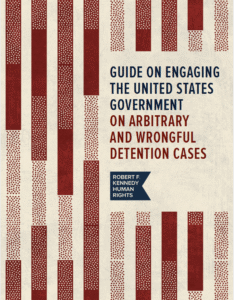View the full UNWGAD petition here.
(May 20, 2016 | Washington, D.C.) Today, Robert F. Kennedy Human Rights submitted an urgent action and petition to the United Nations Working Group on Arbitrary Detention on behalf of Aya Mohamed Nabeel Ahmed Hijazi and Mohamed Hassanein Mostafa Fathallah, co-founders of the Belady (“My Country”) Foundation, who have been unlawfully detained by the Egyptian government for over two years.
“The Belady Foundation case is a paradigmatic example of the lengths that Egyptian authorities are willing to go to crackdown on civil society and silence the voices of even non-political youth leaders,” said Kerry Kennedy, President of Robert F. Kennedy Human Rights. “Aya and Mohamed are model Egyptian citizens. For the government to detain them in punitive pretrial detention for over two years is a haunting reflection of the current state of affairs in Egypt.”
Mrs. Hijazi and her husband Mr. Hassanein are volunteers who founded and established Belady Foundation—a well-respected non-governmental organization (NGO) based in Cairo that works with street children to provide vital rehabilitation and programs to address sanitation and sexual exploitation. The organization hosts activities for street children from art and music classes to a recycling program, and provides a safe haven for minors who have fled their homes and would otherwise be homeless and subject to abuse on the streets. In May 2014, Mrs. Hijazi and Mr. Hassanein were arrested during a warrantless police raid conducted on the Belady Foundation offices, along with two other Belady Foundation volunteers. Three other volunteers were arrested weeks later, and one additional volunteer is being tried in absentia.
“Aya and Mohamed are shining examples of the type of socially-engaged citizens that every country should do their best to cultivate. Yet along with others in civil society, the Egyptian government is treating them as a threat,” said Wade McMullen, Managing Attorney for Robert F. Kennedy Human Rights. “The growing crackdown on independent civil society, and this case in particular, should send red flags to all of Egypt’s international allies who see Egypt as a viable partner in global efforts to counter violent extremism. When a government silences its peaceful, socially-engaged citizenry, it creates a breeding ground for the violent elements of society to thrive.”
In September 2014, the government subsequently leveled a series of baseless charges against Mrs. Hijazi, Mr. Hassanein, and their six co-defendants, including “establishing a criminal organization with the purpose of human trafficking for sexual exploitation, participation in protests, and the collection of donations.” Despite overwhelming evidence to the contrary, including the government’s own forensic medical report on the minors that found no signs of sexual abuse or torture from their time at Belady Foundation, the false charges have been allowed to stand and the case has been referred to trial.
Today, Mrs. Hijazi, who is both a citizen of the United States and Egypt, and Mr. Hassanein have been held in pretrial detention for over two years in violation of Egypt’s international human rights obligations and its own domestic law which sets forth a maximum period of two years for pretrial detention in cases of first instance. Mrs. Hijazi and Mr. Hassanein are among at least 1,464 persons held in pretrial detention in Egyptian prison beyond the legal maximum. In flagrant disregard for their due process rights at every stage of the proceeding, Mrs. Hijazi and Mr. Hassanein have faced near-automatic detention renewals and their requests for bail and conditional release have not been granted proper due process consideration. Their next court date is scheduled for May 21, 2016.
The arbitrary arrest and prolonged pretrial detention of Mrs. Hijazi and Mr. Hassanein violate numerous provisions within Egypt’s domestic law and under the government’s international human rights obligations per the International Covenant on Civil and Political Rights and the African Charter on Human and Peoples’ Rights. In particular, the overly-restrictive and outdated NGO Law, under which Mrs. Hijazi and Mr. Hassanein have been charged, is inconsistent with protections for the fundamental right to freedom of association under international human rights law and Egypt’s Constitution.
The ongoing arbitrary detention of Mrs. Hijazi and Mr. Hassanein is occurring amidst a growing government crackdown on civil society in Egypt. In addition to the extreme measures being taken against the country’s most prominent human rights groups and individual defenders, authorities have increasingly targeted other independent voices, including peaceful protesters and even non-political persons like teenager Mahmoud Mohamed Ahmed Hussein—kept in punitive pretrial detention for over two years for wearing an anti-torture t-shirt—and novelist Ahmed Naji—sentenced to two years for harming public morality for explicit content in his novel. The detention of persons like Hussein, Naji, and the Belady co-defendants depicts the extent that the Egyptian authorities have gone to silence youth voices and persons of possible societal influence even outside of the political arena.




